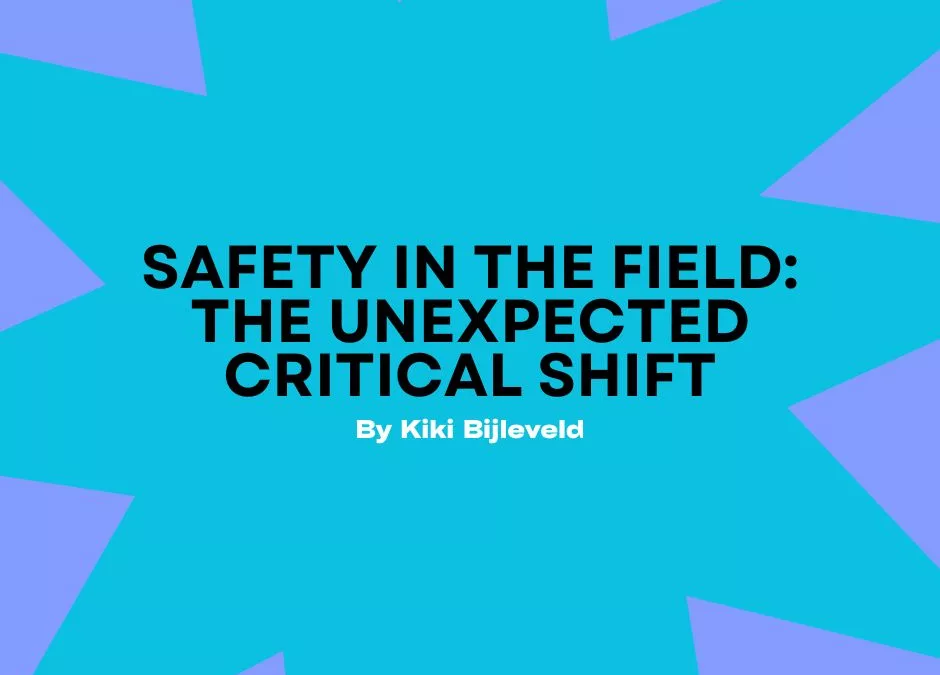By Kiki Bijleveld
The intimate practices of ethnographic fieldwork are imbued with power relations, that sometimes lead to (sexual) harassment and other forms of unsafety. What can the narratives of (ex-)fieldworkers tell us about unsafe working conditions and how can they help us improve training and support for future researchers?
Introduction
Commissioned by and in collaboration with LOVA, I conducted a qualitative study on (sexual) harassment and other forms of unsafety in a fieldwork context and wrote a master thesis that analyzed the experiences of (sexual) harassment in the field and university policy around those experiences. I held fourteen in-depth interviews with both (ex-) fieldworkers and ‘policy-making officials’ (university policymakers, security personnel, and professors providing students with manuals, training, and classes). Through the narratives of my respondents, I was able to address what policy around ‘safety in the field’ amounts to on paper, and in practice, and its perceived differences and effectiveness. First of all, it was striking and shocking how respondents experienced issues of unsafety and harassment as commonplace. Respondents shared their experiences with assault, unwanted touching and even, in one case, rape. My research demonstrates significant differences and inefficiencies in safety policies, the need for better policies, and lastly, the necessity for a critical reflection on anthropological research practice.
Differences and Inefficiencies
There are significant differences in how policy around safety in the field is constructed and executed among and within different Dutch universities, and within specific universities. At one university for example, one of the policy-making officials stated that all students who go abroad (within this certain Dutch university) are required to follow training on health and security. While some students indeed followed the mandatory training, others had however never heard of it. There was a visible gap in how students were prepared and cared for (i.e. in what terms students were guided during their research journey both academically and emotionally) during and after their fieldwork period, which often relates to the personal supervision they received. For instance, some students spoke with their supervisor regularly, about both their research and personal matters, whereas others spoke less frequently or withheld from sharing any emotional or personal experiences. The interviews show that aftercare is lacking greatly in general. In one particular example, a supervisor even downplayed the experience of harassment (after a student was yelled at, demeaned, and grabbed by the wrists during an interview).
Towards better policy
There are multiple ways in which we can make fieldwork a safer practice. An example is conversations between former and future fieldworkers (as a means of fieldwork preparation) to discuss risk actualities and experiences in the field. Another suggestion is teaming up with a trusted partner organization connected to a university, wherever students conduct their fieldwork. A partner organization as such could orientate students once they are in the field, and teach students local customs. More importantly, an organization as such can offer practical help if anything bad would happen. They would serve as a physical safety net that can bridge the distance between the field and home. These examples are some of the many suggestions made in order to improve policy around fieldwork and thus improve the safety conditions of doing fieldwork in general.
A critical reflection on anthropological research
To improve working conditions of fieldwork researchers, we have to not only look at university policies and see what is being done. More importantly, we have to ask what is not being done in terms of providing training and support for field workers? By analyzing the fieldwork experiences and the (lack of) protocols in place, my research and my thesis give Dutch universities a certain ‘share’ of responsibility. However, during my research period, an unexpected ‘theme’ emerged. As a result, I found myself with a twist where I not only ‘blame’ the lacking policy of Dutch universities, but also blame, in a sense, anthropology. During the interviews I came upon a commonly shared idea: an ideal, among (especially younger, first-time) fieldworkers on what ethnography should entail: an ‘Indiana Jones-like’ adventure towards obtaining rich data in a preferably challenging research context (far away from home, by themselves). With the eye on the prize, and the need to prove themselves, they follow a research journey filled with challenges; challenges they feel they must survive by which they push themselves out of their comfort zone continuously and veil their vulnerabilities. The ideal that the research itself must be tough, and so must the researcher, might impact their safety. On top of that, researchers hardly report harassment as they are afraid it might state they cannot live up to the ‘ideal’, and they might feel like experiences as such are a given aspect of doing ethnographic fieldwork.
Thus, taking into account the Indiana Jokes-like aspect of doing ethnographic fieldwork, I feel it is safe to suggest that, perhaps, we should not solely focus on improving fieldwork conditions by blaming insufficient university policy (which, indeed has its many imperfections and offers a lot of room for improvement), but perhaps we should take a critical look on how we (anthropologists) idealize and fetishize our demanding idea of ethnographic fieldwork.
Kiki Bijleveld (MSc Cultural Anthropology and Development Sociology, Leiden University)
